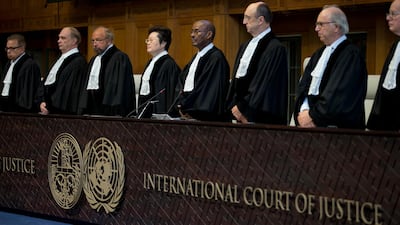The United States on Wednesday rebuffed the UN’s highest court after it was ordered to lift sanctions for humanitarian supplies to Iran.
US Secretary of State Mike Pompeo responded to the ruling by pulling out of a 63-year-old treaty with Iran that underpinned the legal case and promised “enduring peace and sincere friendship” between the two countries.
He said that the UN court's ruling just a month before the US reimposes sanctions on the Iranian regime marked a useful moment to demonstrate the “absolute absurdity” of a treaty that pre-dated the 1979 Revolution.
“We will see what the practical fallout is,” he told a news conference in Washington DC. “The Iranians have been ignoring it for an awfully long time.”
________________
Read more:
Trump says Iran ‘funds’ Middle East slaughter and urges regime’s isolation
Saudi Arabia supports Donald Trump’s strategy to counter Iran, says Jubeir
________________
The robust US response came after Iran secured a partial victory at the International Court of Justice in a legal challenge to Donald Trump’s move in May to restore sanctions on the regime. Iran had claimed that the sanctions breached the 1955 Treaty of Amity that also promoted economic and consular ties.
In a preliminary ruling, the courts said that Washington must not reimpose sanctions on medicines, food and spare parts for civil aircraft. The ruling did not go as far as Iran has requested.
Iran had still claimed victory with foreign minister Mohammad Javad Zarif praising the ruling on Twitter as a “victory for rule of law”. The rulings of the court are binding but the court has no powers to enforce its decisions.
Announcing his plan to end the 1955 treaty on Wednesday, Mr Pompeo said it should have been scrapped decades ago. Diplomatic ties were cut following the 1979 Revolution and the takeover of the US embassy.
The snubbing of the UN court is the latest rejection of multilateral institutions by the United States. National security adviser John Bolton said last month that the international criminal court (ICC), also based in the Hague and set up to try people accused of human rights atrocities, was “already dead to us”.

